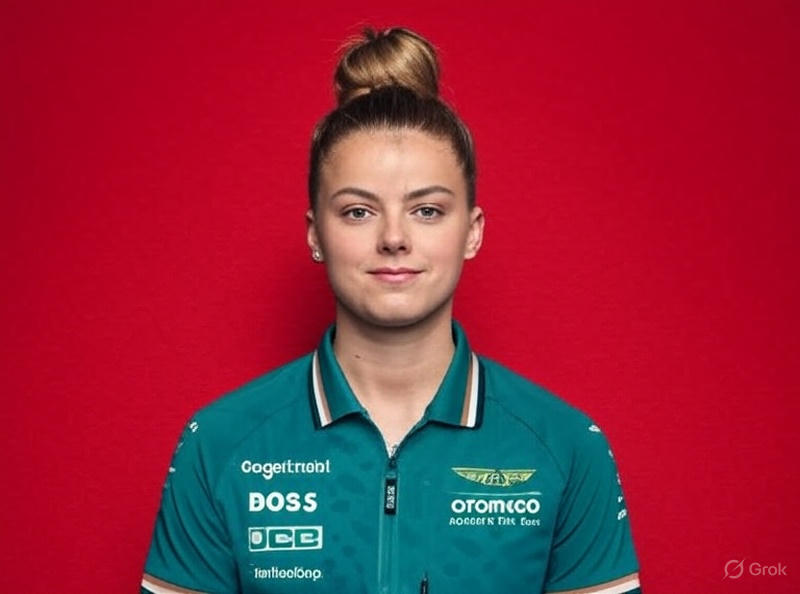Aramco’s Partnership with F1 Academy: Inspiring the Next Generation of Women in Racing and STEM
Introduction
Aramco, a global leader in energy and chemicals, has partnered with F1 Academy to create more opportunities for women in motorsports while promoting sustainability and STEM education. At the heart of this initiative is Tina Hausmann, a 17-year-old Swiss racer representing the Aston Martin Aramco Formula One Team, who is turning her racing career into a platform for innovation and education.
Tina Hausmann: A Rising Star in F1 Academy
At just 17, Tina is proving that motorsports can be a bridge between racing and STEM education. Starting her career at age seven in go-karting, she quickly realized her ambition extended beyond personal racing goals — she wanted to create a path for future generations of women in motorsports.
Her role in F1 Academy is not just about winning races, but also about inspiring girls worldwide to pursue careers in engineering, science, and sustainability.
Through our partnership with @f1academy, we enable the next generation of racers to achieve their ambitions, while inspiring them to explore careers in STEM through their passion for motorsports pic.twitter.com/BCqFOZL4MN
— aramco (@aramco) September 8, 2025
How Racing Meets Education
Tina’s unique journey shows how motorsports and education connect. She has used her racing experiences to explore advanced fuels developed by Aramco. In fact, her school thesis focused on e-fuels and their sustainability role in Formula One, proving how passion for racing can transform into academic innovation.
Advanced Fuels: A Step Toward Sustainability
One of the biggest highlights of the Aramco-F1 Academy partnership is advanced fuel development.
- These fuels are made from carbon and hydrogen, designed to lower emissions.
- They function as drop-in fuels, meaning they can be used in racing cars and everyday vehicles.
- They aim to achieve net-zero emissions, recycling carbon from the atmosphere instead of releasing more.
Aramco’s innovation aligns with Formula One’s goal of 100% sustainable fuels by 2026 and achieving carbon neutrality by 2030.
The Broader Impact on Formula One
Formula One has always been a testing ground for innovation, and this partnership continues that tradition. Advanced fuels and sustainable practices could reshape how motorsports are viewed — not just as entertainment, but as a catalyst for global change in energy solutions.
Inspiring STEM Careers Through Motorsports
Beyond racing, this collaboration serves as a powerful STEM outreach program. By showcasing real-world applications of science and technology in motorsports, the initiative encourages students to pursue careers in:
- Mechanical and automotive engineering
- Fuel and energy innovation
- Data analytics and AI in racing
- Sustainability research
FAQs
Q1. Who is Tina Hausmann?
Tina Hausmann is a 17-year-old Swiss racing driver representing the Aston Martin Aramco Formula One Team in the F1 Academy.
Q2. What is Aramco’s role in F1 Academy?
Aramco partners with F1 Academy to promote diversity in motorsports, develop advanced sustainable fuels, and inspire STEM education.
Q3. What are advanced fuels?
Advanced fuels are low-emission, net-zero fuels created by recycling carbon from the atmosphere, designed for both racing and road vehicles.
Q4. Why is this initiative important for STEM?
It bridges motorsports and education, showing how science and engineering innovations can directly impact sustainability and inspire careers in STEM.
Q5. What is F1’s sustainability goal?
Formula One aims to use 100% sustainable fuels by 2026 and reach carbon neutrality by 2030.
Conclusion
Aramco’s partnership with F1 Academy — highlighted by Tina Hausmann’s journey — is more than a racing project. It represents a fusion of speed, science, and sustainability, inspiring women and students worldwide to see STEM not as textbooks, but as an exciting, real-world career path.
Opinion
While Aramco’s partnership with F1 Academy is commendable, it raises a larger question: Can sports alone drive long-term sustainability and equality? Motorsport has historically been male-dominated, and although Tina Hausmann’s story is inspiring, genuine change will require continuous investment, cultural shifts, and wider accessibility. Similarly, while advanced fuels are a breakthrough, they must be paired with policy support, affordability, and scalability to create real environmental impact.
Ultimately, this collaboration is both symbolic and practical — symbolic because it empowers women in a male-dominated field, and practical because it invests in sustainable technology. The real test lies in whether initiatives like this can move beyond the racetrack to reshape industries, societies, and the global pursuit of equality in STEM.


0 comments